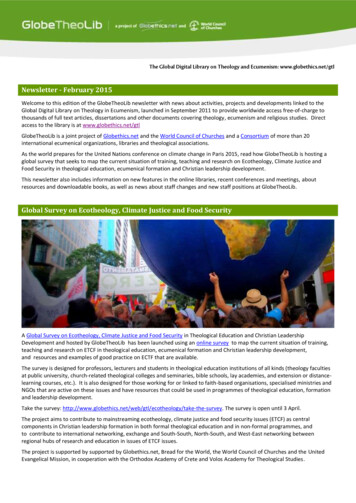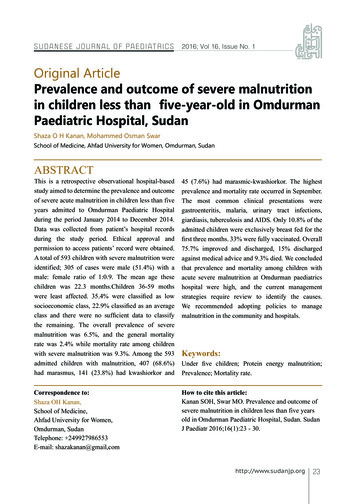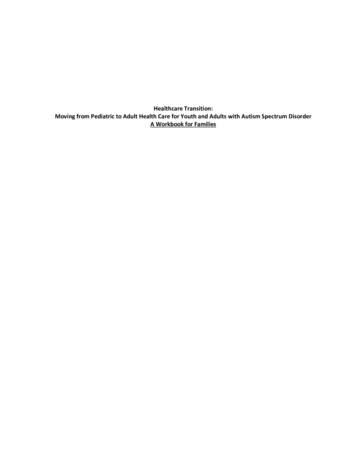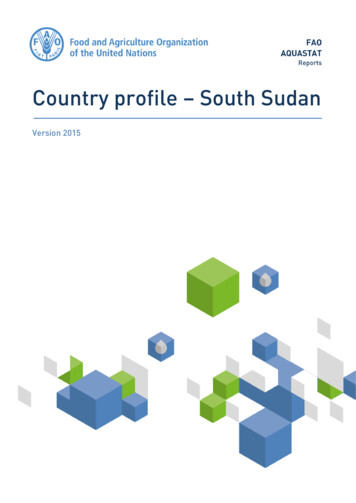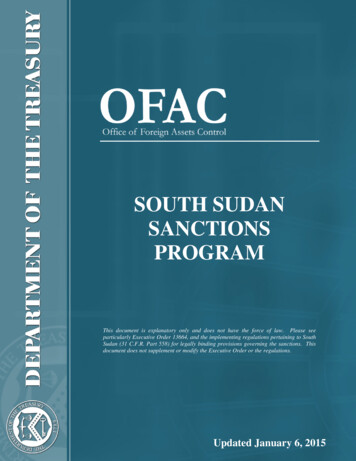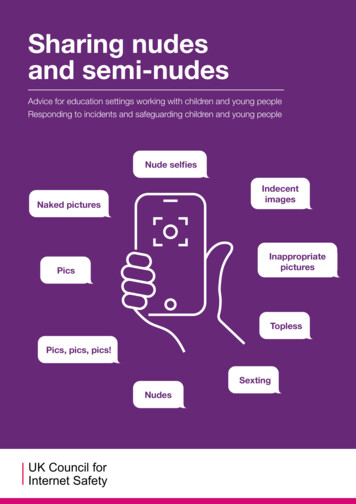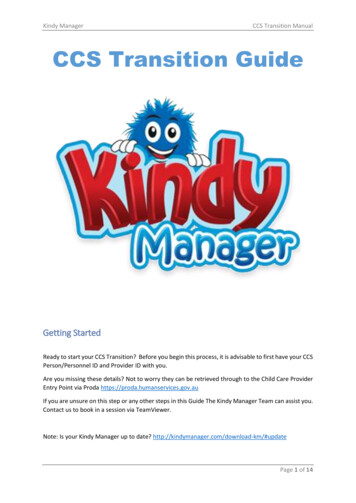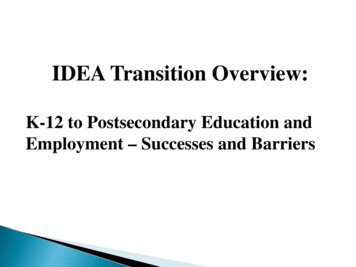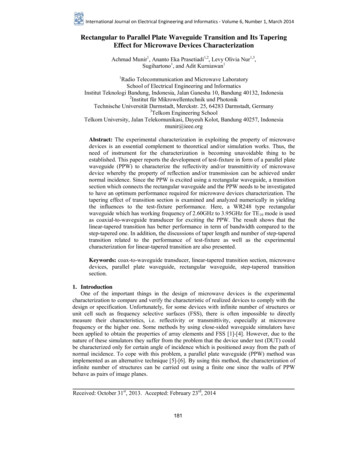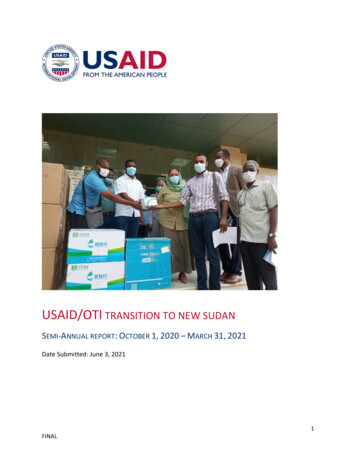
Transcription
USAID/OTI TRANSITION TO NEW SUDANSEMI-ANNUAL REPORT: OCTOBER 1, 2020 – MARCH 31, 2021Date Submitted: June 3, 2021FINAL1
USAID/OTI TRANSITION TO NEW SUDANSEMI-ANNUAL REPORT: OCTOBER 1, 2020 – MARCH 31, 2021SWIFT V IDIQ 7200AA19D00015TASK ORDER 7200AA20F00014COVER PHOTO: Delivery of COVID-19 testing kits by Transition to New Sudan to the National Public HealthLaboratory in Khartoum, Sudan. Photo taken by a staff member of the National Public HealthLaboratory, the Grantee.DISCLAIMERThe authors’ views expressed in this publication do not necessarily reflect the views of the United StatesAgency for International Development or the United States government.FINAL2
TABLE OF CONTENTSPROGRAM DESCRIPTION4COUNTRY CONTEXT5ACTIVITY HIGHLIGHTS8MONITORING AND EVALUATION, RESEARCH, AND REPORTING14PROGRAM OPERATIONS17NEXT STEPS AND PRIORITIES20
SECTION 1PROGRAM DESCRIPTIONThe USAID/Office of Transition Initiatives (OTI) Transition to New Sudan (TNS) program aims tosupport the consolidation of Sudan’s democratic transformation through activities that:1. enable the civilian-led government to demonstrate progress on key transition processes.2. strengthen civic engagement.3. expand independent media.From October 2020 through March 2021, the TNS program built on the successful relationshipsestablished during the previous reporting period to design and implement 34 activities across the threeobjectives utilizing a variety of mechanisms, including grants under contract, short term technicalassistance, in kind assistance, and direct distribution of goods and services.Based on trust and the commitment towards a consolidation of Sudan’s democratic transition, TNSstrategically worked across the board in close cooperation with key government entities including thePrime Minister's Office and twelve other ministries to develop activities with a total value of approximately 5 million in technical assistance and equipment. Support focused on technical assistance, skills and needsassessments, and essential commodities. Additionally, TNS strategically supported foreign policy objectivessuch as the lifting of long-standing sanctions. Current programming helps Sudan build inclusive economicpolicy and attract critical international investment. This includes providing technical assistance in nationallevel policymaking, budget preparation, and strategic communications, all laying the groundwork for longterm institutional capacity and reform. TNS also leveraged OTI’s fast and flexible programming principlesto provide rapid response to unforeseen challenges, such as providing emergency sandbag deliveries duringhistoric floods in 2020 and COVID-19 testing kit supplies during Sudan's second wave in January 2021.Moreover, in advance of a spike in prices ahead of Ramadan, TNS worked with the transitionalgovernment's Selati program to provide the infrastructure needed to boost production of essential foodcommodities. Further activity highlights are detailed below in Section 3.FINAL4
SECTION 2COUNTRY CONTEXTFrom October 2020 to March 2021, Sudan continued its transition from 30 years of autocratic rule underthe previous regime to an increasingly democratic state. The Civilian Lead Transitional Government(CLTG) focused their efforts on consolidating democratic gains on the political side while also working toprioritize citizen safety. Myriad political and security developments occurred during this reporting period,most of which are related to the peace process and the economic reforms advanced by the CLTG. Beloware some of the key developments that occurred in Sudan during the reporting period.Developments in the peace process:The signing of the Juba Peace Agreement (JPA) was a milestone in Sudan’s transition towards democracyand signaled the beginning of key governance reforms.On 3 October 2020, the CLTG signed the JPA with the Sudan Revolutionary Front (SRF) ending a decadeslong war in Sudan. The SRF is a coalition of armed groups and movements from South Kordofan, BlueNile, Darfur, Eastern, Central and Northern Sudan. Consequently, the JPA gave the SRF leadership seatsin the Sovereign Council (which is the collective head of state of Sudan in the transitional period). TheSRF leadership were also allocated seats in the Minister’s Cabinet in February 2021 and inthe Legislative Council (which is yet to be formed) while the SRF factions and soldiers will be integratedinto the Sudan Armed Forces over the months following the signing. Despite the considerable number ofpeace signatories under the JPA, two major rebel movements - Sudan People’s LiberationMovement - North led by Abdulaziz Al Hilu and the Sudan Liberation Movement, led by Abdelwahid alNur did not sign the agreement during the time as negotiations did not proceed. These movements controllarge parts of Darfur, South Kordofan and Blue Nile states and have strong following and support.Nevertheless, the Sudanese public and international community perceived the signing of the JPA as abreakthrough by the CLTG in the peace process. Furthermore, the enforcement of the JPA amended theconstitutional document, which governs the country, to allow for the extension of the transitional periodfor another year. This means that elections will take place in late 2023 as opposed to the original date oflate 2022. The JPA also allows the military wing to extend its leadership of the Sovereign Council to May2022 after it was supposed to be handed over to full civilian rule in February 2021.On 27 March, five months after signing the JPA, the Sudanese Transitional Government and Sudan People’sLiberation Movement-North (SPLM-N) signed a Declaration of Principles (DOP) which pave the way forpeace talks to begin between the two. As per the DOP, the parties agreed to a permanent cease-fire oncethe security arrangements are settled and agreed that Sudan will not adopt any official religion as a sourceof law and governance. Many political parties welcomed this decision through statements on socialmedia; however, Islamist groups and a considerable portion of the public rejected the DOP’s provisionson secularism.Formation of the Transitional Partners CouncilOn 4 December 2020, in line with the JPA, a new body named the Transitional Partner’s Council (TPC)was formed. It is composed of representatives of the military, new signatories of the JPA and the Forcesfor Freedom and Change (an alliance of civil and armed coalitions who negotiated the power sharingagreement with the military wing which ushered in the transitional period). Although the formation ofFINAL5
the TPC was stipulated in the amended constitutional document, it triggered a dispute between thetransitional parties as the council was given a broad mandate to direct the transition and sweeping powersto implement its decisions. The Prime Minister, members of the Sovereign Council, major civil societyorganizations and the public at large voiced their opposition to the TPC, claiming that the authority todirect and monitor the transition is an exclusive power of the legislative council. As a compromise, moremembers of the FFC were included in the TPC, however the powers of the TPC remain unchanged andthe TPC has since been ruling on key matters relating to the transitional period.Government reshuffle in line with JPAOn 8 February 2021, Prime Minister Hamdok announced the formation of the newtransitional government in accordance with the JPA. The cabinet reshuffle replaced all but four ministersand created six new ministries. Ministers were appointed from over ten different political parties andgroups and the Prime Minister ordered the reshuffle of his office in line with the ministerial changes. Themajority of civil society and print media welcomed the changes but also criticized the poor representationof women and youth in the new government as only three ministers out of twenty-six were women.Key economic developments and reforms:One of the most critical developments in Sudan’s economic affairs was the country’s removal from theState Sponsors of Terrorism List (SSTL). This step was a catalyst for increased economic reforms andhelped Sudan rejoin the international community after three decades of economic and political isolation.Lifting of Sudan from State Sponsors of Terrorism ListOn 14 December 2020, the United States government announced Sudan’s official removal from the StateSponsors of Terrorism List (SSTL). This event marked a huge milestone in relations between Sudan andthe U.S, as Sudan had been on the list for 27 years due to the previous regime’s involvement in acts ofterrorism. The political development was seen by observers as a great achievement of the CLTG and astep forward towards restoring Sudan’s position within the international community and increasing foreigninvestment and aid to contribute to reviving the country’s battered economy.Reinstatement of Sudan’s sovereign immunityOn 21 December 2020, the United States Congress passed a bill that reinstated Sudan’s sovereignimmunity after the removal of Sudan from the SSTL. The restoration of Sudan’s legal immunity, wherebythe government of Sudan can no longer be sued in U.S. courts, opens doors for increased foreign tradeand investment by reducing the financial risks of attachment to Sudan’s assets. The legislation alsoauthorized 700 million USD in direct economic assistance to Sudan to be allocated towards debt reliefamong other government support programs. The Sudanese public and the international communityperceived this as a chance for positive impact on the country’s economy.Signing of Abraham AccordsOn 6 January 2021, the CLTG signed the Abraham Accords, a US brokered agreement which paves theway to normalization of ties between Israel and several countries in the Middle East including Sudan. Thisagreement allowed Sudan to access funds amounting to 1.15 billion USD to help Sudan clear its arrearsto the World Bank, which was successfully completed in March 2021, per the below.FINAL6
Unification of Sudan’s currency exchange rateOn 21 February 2021, the Central Bank of Sudan (CBoS) announced the unification of the currencyexchange rate through a circular that directed banks to determine their rates based on supply anddemand. The Ministry of Finance and Economic Planning (MOFEP) announced that this step was taken tostabilize the currency exchange rate, attract remittances from Sudanese expatriates, attract foreigninvestment, stimulate exports, and write off Sudan's foreign debts. Despite substantial public debate, asdocumented in print and social media, the shift saw an immediate uptick in citizens exchanging hardcurrency in banks instead of the black market. As of the end of this reporting period, the official rate hasstabilized and remains in line with the black-market rate.Clearance of arrears to the World BankOn 26 March, Prime Minister Abdallah Hamdok announced that Sudan has fulfilled qualifying conditionsfor clearing its 50 billion external debt to the World Bank’s International DevelopmentAssociation (IDA). This placed Sudan a step closer to receiving comprehensive external debt relief underthe Heavily Indebted Poor Countries (HIPC) Initiative. This was made possible through a bridge loan of 1.15 billion USD provided by the US Treasury Department. Most political parties and economists inSudan welcomed this step as it was perceived as a huge milestone towards Sudan’s economic relief. Theclearance of arrears also enabled Sudan to access funds amounting to 2 billion USD to support povertyreduction and sustainable economic recovery.FINAL7
SECTION 3ACTIVITY HIGHLIGHTSIntroduction:During the current reporting period, TNS focused on implementing 28 activities under Program ObjectiveOne, (enabling the government to demonstrate progress on key transition processes) building on gainsfrom the TNS Bridge Program and initial startup activities to capitalize on established relationships withinthe Civilian Led Transitional Government (CLTG) to take forward key priorities of the government.Nevertheless, the program made steady efforts in implementing four activities under the second objective(strengthening civic engagement) and two activities under the third objective (enabling independentmedia). TNS conducted a multitude of activities that enhanced the CLTG’s progress in sectors includingeconomic reform, strategic communications, service delivery, and direct support to the Prime Minister’sOffice (PMO) and also engaged in fostering civic engagement and expanding independent media.Furthermore, in January 2021, TNS conducted a Rolling Assessment (RA) to identify the program’sstrategic priorities for the upcoming quarter, solidify the team’s understanding of OTI’s approach toactivity clusters and finalize the TNS Objective One Activity clusters as a guide for the 3-6 months thatfollowed. The RA convened TNS Program Team Members as well as Senior Management Team membersand the OTI Regional Advisor and M&E Advisor. Overall, the RA yielded positive feedback from the teammembers and guided programming from January onwards. This section highlights some of the activitiesto demonstrate the program’s progress towards its objectives.Objective 1: Enabling the government to demonstrate progress on key transition issues.Sub-objective 1.1: Enabling/Strengthening governmental functions.During this reporting period and underKHT010:Responding to Flooding in Khartoum, TNSprovided the PMO with 70,000 sandbags to distribute toareas that were in most need during the 2020 floods inSudan. During that time, the CLTG was already facing theimpact of the COVID-19 pandemic as well as aneconomic crisis. Through this activity, TNS strengthenedthe government’s ability to respond to a natural disasterthat affected more than 500,000 people. While thesandbags were not actually used in flood response, theactivity successfully demonstrated the program’s speedand provided crucial program learning, especiallyregarding the timing of crisis response activities. Thelessons learned included recommendations for TNS tosupport grantees to prepare pre-emptive response KHT010: Sandbags provided to PMOcapabilities rather than supporting grantees amidst thecrisis, especially in crisis that have a seasonal nature such as floods. Moreover, that activity developmentmust ensure that the crisis continues to be relevant for a sufficient duration to allow TNS and the granteeto respond effectively, as some crises may end before the response has been completed.FINAL8
TNS also supported the CLTG’s strategic communications under activities KHT018: FacilitatingCitizen-Government Communication and KHT015: Improving the CLTG’s DisinformationManagement. Under KHT018, TNS provided the PMO with an in-kind grant to support capacitybuilding trainings for staff across 18 state government media offices. These trainings aim to improvecommunications between government and citizens at the state level and so far, staff in 15 out of 18 stateshave been trained. The trainees consist of staff from diverse backgrounds including people with disabilities.Some trainees described the experience as life-changing and thanked USAID/OTI for giving them skills toimprove their work standard. Further, to help the CLTG curb the spread of rumors about key transitiontopics and advance its strategic communications, under KHT015, TNS is currently supporting theestablishment of a Disinformation, Research and Monitoring Hub (DRMH) at the Ministry of Informationand Culture by providing Information Technology (IT)equipment needed for the operation of the DRMH. KHT018: Training in North KordofanFurthermore, preparations for trainings on contentproduction and disinformation monitoring for heads of communications departments at key ministries hasstarted. This activity also builds on three prior activities conducted under the DT Global Bridge program,a six-month OTI program that was the precursor to the full award – now the TNS program, that trainedstaff from three ministries on strategic communications,supported an initial mapping on the need forcountering disinformationandmapped these effortsfor the PMO . Together these activitiesdemonstrated program continuity and learning fromOTI’s earlier engagement.Additionally, under KHT030: Equipping the Sudan National Radio and Television Corporation,TNS provided the Sudan National Radio and Television Corporation (SNRTVC) with studio equipmentand hired a Partnerships & Grants Manager. This was done to support the SNRTVC’s transformation froma propaganda arm for the previous regime to a multi-purpose enterprise that displays credible andappealing content to the diverse Sudanese population. This support builds on that provided to SNRTVCby USAID/OTI under the DT Global BridgeProgram, including an internal needs assessment,graphics support, COVID-19 messaging andprovision of equipment which was usedto establish a well-known and highly praisedstudio called the Ali Shumu Studio. The head of theSNRTVC stated that they have not received thistype of supportsince 1962.Sub-objective 1.2: Supporting national level policymaking.As a continuation of the TNS Bridge program, TNSprovided five ministries with short-term technicalassistance by hiring consultants who played critical KHT001: Prime Minister Hamdok at the SFSP launchroles in advancing national-level policy making.During this reporting period and under activity KHT001: Supporting the Launch of the FamilySupport Program, TNS embedded three consultants at the Ministry of Finance and Economic Planning(MOFEP) to support the launch of the Sudan Family Support Program (SFSP) which was officiallyinaugurated by Prime Minister Hamdok in March 2021. The SFSP is a three-year cash transfer programwith a budget of 1.8 billion USD aimed at mitigating the impacts of economic reforms through providingFINAL9
80% of the Sudanese population with monthly cash transfers. The consultants, who worked for six months,assisted the MOFEP in the design of the payment systems, database architecture, and data governance andprivacy for the SFSP.Further, under KHT002: Facilitating informed economic policy making, TNS hired an EconomicResearch Associate to work at the MOFEP’s newly established Policy Analysis and Monitoring Unit(PAMU). Since December 2020, the consultant helped the MOFEP analyze the impact of proposedeconomic reforms which the CLTG is undertaking and is monitoring their impact. These include researchon poverty reduction strategies, public sector reform policies, among others.Additionally, the Ministry of Youth and Sports(MOYS) made critical changes to its organizationalstructure through support from the HumanResources Consultant that TNS embedded at theMinistry under KHT003: Building the capacityof the Ministry of Youth and Sports. TNS alsoenabled two other ministry departments to supportyouth during the transition through hiringconsultants who contributed to the development ofprojects such as the Sudan Sports Framework anddevising Youth Democratic Center’s Training KHT002: Poverty reduction strategy workshop headed bymodules. Furthermore, under KHT004: Building TNS consultant in Blue Nile Statethe capacity of the Ministry of Agriculture, TNS hired a Senior Advisor at the Ministry of Agriculture.The Senior Advisor helped the ministry coordinate efficiently with other line ministries to enable thelaunch of Sudan’s first Comprehensive Agricultural Census in five decades.Lastly under KHT005: Addressing capacity gaps at the Ministry of Justice, TNS is embedding aSenior Advisor to the Minister of Justice who has been supporting the minister to efficiently coordinatewith relevant stakeholders on key legal matters according to international best practices. The SeniorAdvisor’s work led to follow on activities for the Ministry of Justice (MOJ) including translation support;executive office support; technical and IT support, strategic communications support and otheractivitiesunder development.One of the Prime Minister’s key objectives toconsolidate the democratic transition focuses oneconomicreform.Tostrengthenthegovernment’s economic reform agenda, TNSsupported three activities coordinated throughthe PMO and in collaboration with otherministries. Under KHT016: The NationalEconomic Conference: Building ConsensusAround Economic Reform, TNS supported athree-day national economic conference, theoutcomes of which defined key economic reformsneeded in Sudan to stabilize the economy bytackling the economic inflation and remedying the KHT016: The national economic conferencedeficits in the fiscal budgets among otherFINAL10
measures. TNS provided in-kind assistance to Partners in Development Services who organized theconference by covering costs of international experts participating in the event and the provision of mediaproduction services and funding COVID-19 mitigation measures. The outcomes of this conference whichincluded recommendations to address the deficits in the fiscal budget and holding an internationalinvestment conference for Sudan to attract foreign investment resulted in the development of thefollowing two activities.These activities are critical to supporting the economicreforms carried out by the CLTG. Firstly, underKHT028:Supportinganinternationalinvestment conference for Sudan, TNS contractedan international corporate finance and advisoryconsultancy firm in February 2021. The firm is currentlysupporting six key ministries in preparation for theFrench-sponsored international investment conferenceon 17-18 May 2021. The firm is helping ministrieshighlight Sudan’s core competency sectors includingagriculture, mining, oil and gas as well as critical enablingsectors such as energy and transport to realize the KHT028: A meeting with the Minister of Justiceopportunities presented by the core competency Nasreldin Abdulbarisectors. Through showcasing this at the international investment conference, Sudan aims to attract foreigninvestment and debt relief to help revive the country’s economy. Secondly, in support of investmentopportunities and more effective government communications, TNS works with the PMO’s MediaCommunication Unit under KHT037: Improving PMO communications through Five ZonesInvestment Videos to highlight Sudan’s natural resources which the PMO defined as five zones ofdevelopment. These include videos on the Gum Arabic Belt, the Red Sea Belt, Rivers Belt, Diverse Cropsand finally a video including a mixture of all the belts which is to be used in the Paris Conferencepresentation. Lastly, under KHT36 Technical Support for the 2021 Fiscal Year Budget, in January2021, TNS provided the PMO with two economic experts who contributed to developing the 2021 fiscalyear budget and ensuring the budget’s adherence to the International Monetary Fund’s directives to Sudan.Objective 2: Strengthening civic engagement.Sub-objective 2.1 Fostering public debate, dialogue, and accountability.As youth were key stakeholders in the 2018 revolution and require support to continue to play a significantrole in Sudan’s democratic transition, three of TNS’ activities under this objective foster public debate anddialogue for youth. Under KHT027: Equipment and Technical Support to Omdurman AhliaUniversity TNS embarked on rehabilitating a student auditorium and meeting room whichaccommodates 500 students at Omdurman Ahlia University (OAU). The halls, which will be provided withfurniture, IT equipment and electroacoustic systems over the coming months, will be utilized to facilitatestudent debates and discussions. Moreover, under KHT021: Rehabilitating the Burri CommunityCenter, TNS commenced the procurement of materials to rehabilitate a youth community center toprovide a space for positive youth engagement. This center is in the neighborhood of “Burri” which wasthe heart of the revolution in Khartoum during the 2018 revolution. It was one of the main hubs whereFINAL11
youth gathered to protest. The activity will provide the needed materials for youth to rehabilitate theirown center and thereby increase community ownership and sustainability of the center. Finally, TNS isusing art to encourage public debate and dialogue on the transition. Under KHT008: RevitalizingSudanese film culture, and during this reporting period, the program team worked on launching a filmfestival where 80 youth from different parts of Sudan and without a filmmaking background will cometogether to create short films on the topic of the transition. Through working closely with the grantee onsetting budgets and plans for the festival, TNS is also building the grantee’s capacity.Objective 3: Expanding independent media.Sub-objective 3.1: Building capacity of independent media.TNS supported independent media through providingthe operational costs for two budding newspapers, TheDemocrat and Alhadatha under the activitiesKHT009:TheDemocrat:SupporttoIndependent Media and KHT007: Alhadatha: asource of objective reporting and democraticvalues. TNS supported the newspapers to print anddistribute 6100 copies of the two newspapers daily,(2100 by Al Hadatha and 4000 by The Democrat).Alhadatha is distributed in 42 locations around Sudanwhile Democrat is distributed in 24 locations. TNSsupport has also covered incentives for 65 newspaperstaff (35 from Al Hadatha and 30 from the Democrat).KHT007 & KHT009: The Democrat and Alhadatha atThe newspapers, which are run by prominent editors sales pointsand journalists enable citizens access to timely,accurate, and reliable information during the transition period. Feedback from readers collected by TNS’Monitoring and Evaluation Officer indicated that these two newspapers are perceived as neutral sourcesof information that are not impacted by political affiliations. Furthermore, an interviewed reader statedthat the Democrat “provides facts as they are”.FINAL12
SECTION 4MONITORING AND EVALUATION, RESEARCH, ANDREPORTINGDuring this reporting period the Monitoring, Evaluation and Learning Team devised monitoring andevaluation plans for activities and carried out final activity evaluations. The MEL Team worked with theCOP and OTI to develop a learning agenda to provide options for platforms to ensure learning is fed backinto the activity cycle throughout the entire activity process.Progress towards program objectivesObjective 1: Enabling the government to demonstrate progress on key transition processes.From October 2020 to March 2021, TNS conducted a total of 28 activities under this objective, 17 ofwhich are ongoing, ten completed and one closed. The activities reached 571 beneficiaries in 14 variousCivilian Led Transitional Government (CLTG) entities as illustrated in table 1 below:Table1: number of activities conducted at different CLTG entities.#1234567891011121314Government entityMinistry of AgricultureMinistry of Finance and Economic PlanningMinistry of Foreign AffairsOffice of the Attorney GeneralMinistry of Interior – Civil Registry DirectorateMinistry of JusticeMinistry of YouthNational Center for Gastrointestinal and Liver DiseasesNational Coordination Committee with UNITAMSNational Public Health Laboratory Khartoum SudanNew Partnership for Africa's Development SudanPrime Minister's OfficeThe Sudanese Consumer Goods Company- SCGThe Sudan Radio and TV General CorporationNumber of activities21111311111711Routine monitoring and Final Evaluation Reports (FERs) which included data collection and key informantinterviews with beneficiaries and grantees revealed that TNS achieved its planned outputs and outcomesin the ten completed activities. Overall, TNS supported the CLTG institutions to better understand theirneeds and priorities, implement policies and offer services more effectively through equipment support,technical assistance, and assessments.1Note per its Local Activity Guide, TNS defines beneficiaries(1), any locally hired STTAs (1-3) or a small team (5-7).FINALas only the direct recipients of support – typically the grantee13
Objective 2: Strengthening civic engagement.A total of four activities fell under this objectiveincluding one completed activity and three otherscleared. Under the completed activity, KHT019:Addressing Sources of Instability in SouthKordofan to Further Peace, TNS helped movethe peace process in South Kordofan forward bysupporting a local partner to hold a three-daydialogue among leaders of the Nuba and Hawazmatribes, which are at conflict with each other. Theoutcomes of this activity included the signing of ajoint agreement between the two parties of theKHT019: Prime Minister Hamdok meeting withdialogue, an announcement of their readiness to Hawazma and Nuba Tribal leadersconvey peace messages to their communities andadopting the peace agreement on the ground and in coordination with the federal and state. The threeother ongoing activities, which are fostering youth civic engagement will serve as a strong basis to assessthe program’s progress in upcoming reports. Through those four activities, the program continues toidentify the best ways to conduct activities in civic engagement considering the swiftly changing civic spaceand the various stakeholders involved.Objective 3: Expanding independent media.TNS has taken steps towards expanding independent media through building the capacity of media outlets,thus two activities fall under this objective, both of which are ongoing. The Monitoring & Evaluation teamconducted the Final Evaluation Reports (FER) early in the project cycle to inform requests for extensionof support by the grantees which proved very beneficial as they informed the decisions on two extensionrequests. Furthermore, TNS’ media officer conducted a Media Gap Analysis to understand the gaps inSudan’s media and information landscape and inform TNS’ media priorities. During the current reportingperiod, most of TNS’ activities fell under objective one as the program attempts to strengthen its existencein Sudan through building on activities from the TNS bridge program.
USAID/OTI TRANSITION TO NEW SUDAN. SEMI-ANNUAL REPORT: OCTOBER 1, 2020 - MARCH 31, 2021 . SWIFT V IDIQ 7200AA19D00015 . TASK ORDER 7200AA20F00014. COVER PHOTO: Delivery of COVID -19 testing kits by Transition to New Sudan to the National Public Health Laboratory in Khartoum, Sudan. Photo taken by a staff member of the National Public Health
